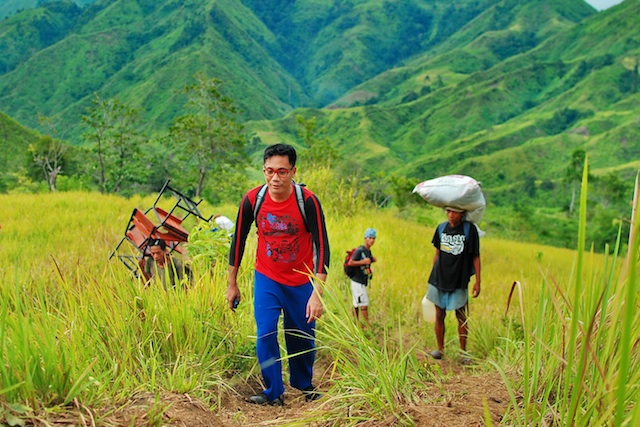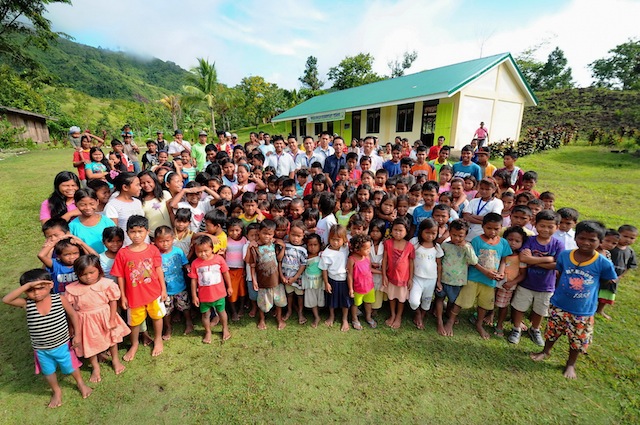DAVAO CITY (MindaNews/31 August) — Mindanawon public school teacher Randy Halasan, the lone Filipino among five Asians who received Sunday the Ramon Magsaysay Award, said in his acceptance speech that he “never expected” to receive the award.
“This is an extraordinary award and it makes me feel very happy and fulfilled,” the 31-year old teacher of Pegalungan Elementary School in the hinterlands of Marilog, Davao City, said during the awarding of what is touted as Asia’s version of the Nobel Prize, streamed live from the Cultural Center of the Philippines from :30 to 6:30 p.m.
“For me, being a Magsaysay awardee is not about becoming popular. Rather, it is a strong call to have a greater passion to serve our fellow Filipinos and to become a true role model and inspiration for others,” Halasan said.
“We can build a strong Philippines,” he said, “if we open our hearts to serve the people without expecting any personal return.”
 Randy Halasan, 31, public school teacher, the lone Filipino among five Asians who received the Ramon Magsaysay Awards at the Cultural Center of the Phlippines on Sunday, August 31. Halasan is shown here on the way to the Pegalungan Elementary School in the hinterlands of Marilog in Davao City, a seven-hour travel from his residence in Davao City. MIndaNews photo courtesy of Arthur Yap
Randy Halasan, 31, public school teacher, the lone Filipino among five Asians who received the Ramon Magsaysay Awards at the Cultural Center of the Phlippines on Sunday, August 31. Halasan is shown here on the way to the Pegalungan Elementary School in the hinterlands of Marilog in Davao City, a seven-hour travel from his residence in Davao City. MIndaNews photo courtesy of Arthur Yap
Halasan added that challenges and obstacles can be overcome “if we are determined, patient and hardworking.”
“Mabuhay po ang mga Pilipino, Mabuhay po ang gurong Pilipino” (Long live the Filipinos, Long live the Philippine teachers), he said.
Halasan narrated that his dream was to be a lawyer or doctor but when he was in college, his father died and he had to work to send himself to school. Given his limited resources, “I therefore studied teaching.”
He recalled how, as a newly-appointed teacher, he first set foot on January 8, 2007 in Pegalungan Elementary School, “the farthest school in all of Davao City,” and told himself “I have to transfer immediately.’ I knew I will not be happy there.”
But as the days passed, “when I saw the poverty in the community, when I saw in the people’s eyes and gestures that they needed me, I began to love who they are and their simple lives. “
He said elder Matigsalugs “openly cried” during the first graduation rites because “they never imagined to see their children finish elementary education, given Pegalungan’s remoteness and isolation.
It takes Halasan seven hours to reach Pegalungan from his house in Davao City – two hours by bus, an hour by habal-habal motorcycle and three hours on foot, crossing two treacherous rivers.
The number of teacher in his school has since increased (there were only two of them in 2007, teaching all grade levels), other school facilities have been constructed and they have opened a high school that “benefits not only te Matigsalugs of Davao but also from Bukidnon.” Marilog is located along the boundary with Bukidnon province.
But Halasan said he was “not happy seeing my hungry students and their impoverished families” so even if he had become school in charge since 2010, “I could not concentrate only on formal education. I decided to extend my world to the community so they could learn how to make their ancestral lands productive.
He encouraged the community to plant cacao, rubber, coffee and other fruit trees. “and the tribe is now practicing multicropping to become food sufficient.” They also planted hundreds of trees along the riverbanks to prevent erosion and floods.
“My vision for the Matigsalug in Pegalungan is to uplift their lives from poverty. This was also the vision of the late President Magsaysay who showed his passion and commitment to serve everyone equally and to ensure justice to all Filipinos,” Halasan said.
 The first time he set foot in this hinterland school in Davao City, Randy Halasan, Ramon Magsaysay Awardee 2014, vowed to immediately seek transfer. “I knew I will not be happy there,” he said in his acceptance speech Sunday, August 31, at the Cultural Center of the Philippines in Manila. MindaNews photo courtesy of Arthur Yap
The first time he set foot in this hinterland school in Davao City, Randy Halasan, Ramon Magsaysay Awardee 2014, vowed to immediately seek transfer. “I knew I will not be happy there,” he said in his acceptance speech Sunday, August 31, at the Cultural Center of the Philippines in Manila. MindaNews photo courtesy of Arthur Yap
He explained that nobody gets rich from teaching “but a teacher like me gets rich from sharing knowledge, values and positive attitude to the community.
Halasan thanked his co-teachers, the Davao City government, field officers in education, agriculture and environment agencies and other generous partners for helping him in his development efforts.
“My deep gratitude also goes to the people of Sitio Pegalungan, officials and tribal elder, our students and their families. They believe in our vision of a dedicated and food- sufficient community,” Halasan said.
He also thanked his former district supervisor, Ava Marie Santiago, the Bato Balani Foundation “and the media who called public attention to our work,” his family for their “unconditional love and acceptance has encouraged me through all the frustrations and dangers” and God for always giving him strength.
Halasan, who received the award for Emergent Leadership, is being recognized for “his purposeful dedication in nurturing his Matigsalug students and their community to transform their lives through quality education and sustainable livelihoods, doing so in ways that respect their uniqueness and preserve their integrity as indigenous peoples in a modernizing Philippines.”
Halasan was the last awardee to deliver his response before President Benigno Simeon Aquino III delivered his message.
In his speech, Aquino said that for those who strive to make this world a more inclusive place, the road to empowerment begins in the place of learning. “The innovations of Ms. Saur Marlina Manurung and Mr. Randy Halasan, who have poured their hearts and souls into their work to educate indigenous communities, bear witness to this. Along with more traditional classroom subjects, they are teaching immediately applicable life skills, such as farming and awareness of the basic rights of each individual,” Aquino said.
Established in 1957, the Ramon Magsaysay Award is Asia’s highest honor and is widely regarded as the region’s equivalent of the Nobel Prize.
The Award celebrates the memory and leadership example of the President who died in a plane crash. It is given “every year to individuals or organizations in Asia who manifest the same selfless service that ruled the life of the late and beloved Filipino leader,” the Ramon Magsaysay Award Foundation (RMAF) website said.
Aside from Halasan, the other winners are journalist Hu Shuli and environmental laywer Wang Canfa from China, educator Saur Marlina Manurung from Indonesia, Omara Khan Masoudi from Afghanistan for protecting Afghan cultural heritage, and The Citizens Foundation from Pakistan for “the social vision and high-level professionalism of its founders and those who run its schools, in successfully pursuing their conviction that, with sustained civic responsiveness, quality education made available to all—irrespective of religion, gender, or economic status—is the key to Pakistan’s brighter future.” (MindaNews)
